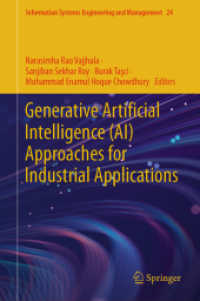Full Description
Islam is not only a religion, but also a culture, tradition, and civilization. There are currently 1.5 billion people in the world who identify themselves as Muslim. Two thirds of the worldwide Muslim population, i.e. approximately a billion people, live in forty-eight Muslim majority countries (MMC) in the world- all of which except one are in Africa and Asia. Of these MMCs in Africa and Asia, only twelve (inhabited by about 165 million people) have ever achieved a high score on the Human Development Index (HDI), the index that measures life expectancy at birth, education and standard of living and ranks how "developed" a country is. This means that the majority of the world's Muslim population lives in poverty with low or medium level of human development.
The contributions to this innovative volume attempt to determine why this is. They explore the influence of environment, space, and power on human development. The result is a complex, interdisciplinary study of all MMCs in Africa and Asia. It offers new insights into the current state of the Muslim World, and provides a theoretical framework for studying human development from an interdisciplinary social, cultural, economic, environmental, political, and religious perspective, which will be applicable to regional and cultural studies of space and power in other regions of the world.
Contents
Section A: The Themes, Premises, and Principles.- Chapter one. The Muslim World and Human Development; Samiul Hasan.- Chapter two. Islamic Jurisprudence: Sources and Traditions Creating Diversity in Human Relationship; Samiul Hasan.- Chapter Three. Human Development: Perspectives, Gaps and Issues for the MMCs; Samiul Hasan.- Section B. MMCs: Geography, Resurces, and People in the MMCs.- Chapter four. The Muslim World: A Geographical Analysis; George Odhiambo.- Chapter five. Biophysical Resources and the Built Environment: Features, Foci, and Issues in the Muslim Majority Countries; Saif AL Qaydi.- Chapter six. People in the Muslim Majority Countries: History, Composition, and Issues; Samiul Hasan.- Section C. Power Relationships and External Influence in the MMCs.- Section D: Power Relationships and External Influence in the MMCs.- Chapter seven: European Colonisation and the Muslim Majority Countries: Antecedents, Approaches and Impacts; Samiul Hasan.- Chapter eight: Power Configuration in the Muslim World: Exploring the Post-WWII Era; S.M. Abdul Quddus.- Chapter nine: Foreign Aid, Foreign Debt, and Development: The Muslim World Scenario; M. Moniruzzaman.- Section D: Human Development in the MMCs: Situational Analysis.- Chapter ten: Economic Activity and Achievements in the Muslim World; Anis Chowdhury and Mohammad Zulfan Tadjoeddin.- Chapter eleven: International Trade and Foreign Investment; Mohammad Zulfan Tadjoeddin and Anis Chowdhury.- Chapter twelve: Urban Infrastructure in the Muslim Majority Countries: A Situational Analysis; Abdelaziz ElJaouhari and Samiul Hasan.- Chapter thirteen: Human Development: Health, Hygiene, and Education in the Muslim World; Abdelaziz ElJaouhari and Samiul Hasan.- Section E: MMCs, Political Integrity and UMMA Solidarity.- Chapter fourteen: Democrazy and Development in the Muslim World; Abdul Rashid Moten.- Chapter sixteen: Democracy and Development in the Muslim World; AbdulRashid Moten.- Chapter fifteen: Muslim Ummah, International Organisations, and Human Development in the MMCs; Ishtiaq Hossain.- Section F. Space, Power, and Human Development: Conlusions, and Recommendations.- Chapter sixteen: Space, Power, and Human Development in the Muslim World: Connections and Conclusions.- Chapter seventeen: Human Development in the MMCs: Diversity of Actions, Uniformity of Purpose, Divirsity of Actions; Samiul Hasan.-








